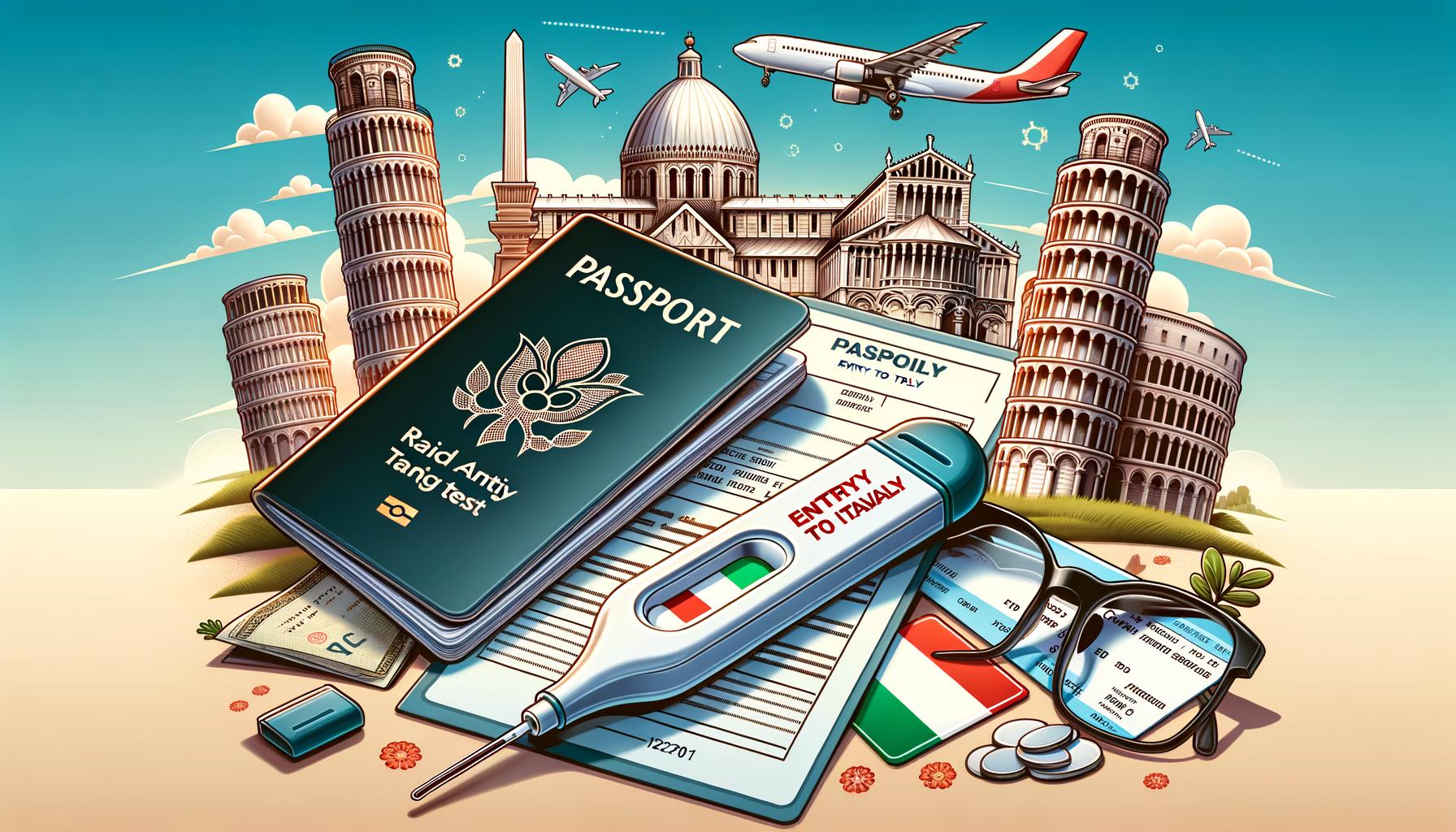Are rapid antigen tests accepted for travel to Italy? As international travel begins to resume amidst the ongoing COVID-19 pandemic, testing requirements have become a crucial aspect of travel planning. In this article, we will explore the role of rapid antigen tests in meeting the travel requirements for entry into Italy and provide an overview of their acceptance by the Italian government.
With the emergence of new variants and persistent global transmission, COVID-19 testing has become a fundamental part of international travel protocols. Specifically, travelers to Italy must adhere to specific testing requirements in order to gain entry into the country. Rapid antigen tests have gained attention as a potential option for fulfilling these requirements, offering a quicker and more accessible alternative to other forms of COVID-19 testing.
In the next sections, we will delve into the current travel requirements for entering Italy, including detailed information on testing requirements and any updates related to rapid antigen tests. Furthermore, we will explore the nature of rapid antigen tests, their reliability in detecting COVID-19 infections, and the official stance of the Italian government regarding their acceptance for entry.
By gaining a better understanding of rapid antigen tests and their role in travel to Italy, travelers can make informed decisions about their testing options before embarking on their journey.
Travel Requirements for Italy
When it comes to traveling to Italy, it is crucial to stay updated on the current travel requirements, especially amid the COVID-19 pandemic. The Italian government has specific guidelines in place for visitors entering the country, including testing requirements. As of now, rapid antigen tests are accepted for travel to Italy, provided they meet certain criteria.
In order to enter Italy, travelers must present a negative COVID-19 test result taken within a specific timeframe before arrival. Currently, rapid antigen tests are accepted for entry into Italy as long as they are performed within 48 hours prior to arrival. It is important to note that this information is subject to change, so it is essential to verify the most up-to-date requirements before traveling.
For those who are considering getting a rapid antigen test for travel to Italy, it is important to understand what these tests are and how they differ from other types of COVID-19 tests. Rapid antigen tests work by detecting specific proteins on the surface of the virus and can provide results in a relatively short amount of time.
While some may question the reliability and accuracy of rapid antigen tests compared to PCR tests, they have been widely accepted for travel purposes due to their quick turnaround time and effectiveness in detecting active infections.
It is recommended that travelers research where they can obtain rapid antigen tests before their trip. Testing sites, clinics, and pharmacies may offer these services, but it is important to consider factors such as cost, accessibility, and timing when scheduling a test. Additionally, individuals should ensure that the testing facility meets the criteria set forth by the Italian government in order for the test results to be accepted for entry into the country.
Understanding Rapid Antigen Tests
Rapid antigen tests have become a crucial tool for international travelers, especially those planning to visit countries like Italy. These tests are designed to detect specific proteins on the surface of the virus, providing quick results in just a matter of minutes. Unlike polymerase chain reaction (PCR) tests, rapid antigen tests do not need to be processed in a laboratory, making them more convenient for travelers who require timely testing before their trip.
Rapid antigen tests
- How do they differ from other types of COVID-19 tests?
- Accuracy and reliability
Rapid antigen tests are different from PCR tests in that they are designed to detect viral proteins and provide quicker results. While PCR tests are considered the gold standard for diagnostic accuracy, rapid antigen tests have also shown to be reliable in detecting COVID-19 infections, particularly in individuals with higher viral loads. However, it is important to note that rapid antigen tests may not be as sensitive as PCR tests and could potentially yield false-negative results.
It is essential for travelers to carefully consider the type of test required for entry into Italy. As of the latest updates, the Italian government does accept rapid antigen tests for entry into the country. However, there may be specific guidelines and criteria regarding the types of rapid antigen tests that are accepted. Therefore, it is advisable for travelers to verify the specific requirements set by Italian authorities before obtaining a rapid antigen test for their trip.
To ensure compliance with Italy’s travel requirements and avoid any inconveniences upon arrival, it is recommended that travelers obtain their rapid antigen test from approved testing sites, clinics, or pharmacies. The cost, accessibility, and timing for obtaining these tests may vary depending on the location and healthcare providers available. It is advisable to schedule an appointment in advance to secure a convenient testing time before departing for Italy.
Ultimately, understanding rapid antigen tests and their acceptance for travel to Italy can help international travelers make informed decisions regarding their testing needs. By staying informed about testing requirements and options, travelers can navigate the process more effectively while ensuring compliance with Italian regulations.
Acceptance of Rapid Antigen Tests for Travel
Traveling to Italy during the COVID-19 pandemic requires adherence to specific testing requirements to ensure the safety of both travelers and residents. As part of these requirements, rapid antigen tests are accepted for travel to Italy, provided they meet certain criteria set by the Italian government.
Rapid antigen tests offer a convenient and quick option for travelers to obtain testing results before entering Italy. Understanding the acceptance of rapid antigen tests and where to obtain them is crucial for anyone planning a trip to the country.
The Italian government has officially stated that rapid antigen tests are accepted for entry into Italy, as long as they meet specific guidelines. Travelers must ensure that the rapid antigen test they take has been performed by professional healthcare providers and is deemed reliable and accurate in detecting COVID-19 infections.
Additionally, the test result must be presented in either digital or paper format and include specific details such as the traveler’s personal information, date and time of the test, and negative result.
For travelers looking to obtain a rapid antigen test for travel to Italy, there are various options available. These tests can usually be obtained at testing sites, clinics, pharmacies, or other designated healthcare facilities. It is important for travelers to research and identify approved locations for obtaining rapid antigen tests based on their departure location and travel itinerary.
Acceptance of Rapid Antigen Tests for Travel
| Key Points | Details |
|---|---|
| Rapid Antigen Test Acceptance | The Italian government officially accepts rapid antigen tests for entry into Italy if they meet specific guidelines. |
| Test Criteria | Rapid antigen tests must be performed by professional healthcare providers and provide reliable and accurate results. |
| Test Locations | Testing sites, clinics, pharmacies, or other designated healthcare facilities offer rapid antigen tests for travelers. |
Where to Get a Rapid Antigen Test for Travel to Italy
Travelers who are planning to visit Italy should be aware of the specific testing requirements for entry into the country. As of the current guidelines, rapid antigen tests are accepted for travel to Italy under certain conditions. Rapid antigen tests have become an essential tool for international travel, as they provide a quick and convenient option for obtaining COVID-19 test results before departure.
Rapid antigen tests can be obtained from a variety of sources, including testing sites, clinics, and pharmacies. Many countries and regions have established dedicated testing facilities to cater to travelers’ needs. The cost, accessibility, and timing for obtaining rapid antigen tests may vary depending on the location and provider. It is important for travelers to research and plan ahead to ensure that they can fulfill the testing requirements before their trip to Italy.
When seeking a rapid antigen test for travel to Italy, it is advisable to check the availability of testing locations in advance. Some countries may have specific requirements regarding the type of rapid antigen test that is accepted for entry, so travelers should confirm that they are receiving an approved test.
Additionally, it may be beneficial to inquire about any documentation or certificates that will be provided upon completing the test, as these may need to be presented during travel or upon arrival in Italy.
It’s essential for travelers to stay informed about the latest updates regarding testing requirements and options when planning a trip to Italy or any other destination. By understanding where to obtain a rapid antigen test and ensuring compliance with relevant guidelines, travelers can avoid potential disruptions during their journey.
Tips for Taking a Rapid Antigen Test
Rapid antigen tests have become a crucial aspect of international travel, including for those planning to visit Italy. These tests are essential for ensuring the safety of travelers and residents by detecting COVID-19 infections before departure. For individuals considering travel to Italy, understanding how to properly prepare for and take a rapid antigen test is important in order to meet the country’s entry requirements.
Proper Preparation
Before taking a rapid antigen test for travel to Italy, it is important to ensure that you have all the necessary documentation and information. This includes confirming the specific type of rapid antigen test that is accepted by the Italian government, as well as any additional requirements such as testing within a certain timeframe before travel. It is also advisable to familiarize yourself with the testing process and any potential pre-test guidelines provided by testing facilities or healthcare providers.
Testing Procedure
When taking a rapid antigen test for travel purposes, it is essential to follow all instructions provided by the testing site or healthcare professional administering the test. This involves correctly collecting the nasal swab sample and ensuring that it is conducted in a hygienic and safe manner. Additionally, travelers should be mindful of any time constraints related to their test result validity and factor in sufficient time for obtaining and receiving their results before their planned departure.
Avoiding Common Mistakes
To maximize the accuracy and reliability of rapid antigen tests for travel to Italy, it is important to avoid common mistakes during the testing process. These may include improper sample collection, failing to adhere to timing requirements, or neglecting any specific guidelines set forth by the Italian government regarding the acceptance of rapid antigen tests for entry.
By being thorough in your preparation and diligent when taking the test, travelers can help ensure that their results will meet Italy’s entry requirements.
What to Do if Your Rapid Antigen Test Is Positive
If you receive a positive result from a rapid antigen test for COVID-19 before traveling to Italy, it is important to take the appropriate steps to protect yourself and others. The Italian government requires all travelers to present a negative COVID-19 test result upon arrival, so a positive result can disrupt your travel plans.
In this section, we will outline the steps to take if your rapid antigen test is positive and provide information on what to do next.
Quarantine Requirements
If your rapid antigen test comes back positive, it is crucial to follow quarantine guidelines to prevent the spread of the virus. The Italian government mandates that individuals who test positive for COVID-19 must self-isolate for a specified period of time upon arrival in the country. It is important to be aware of these quarantine requirements and plan accordingly in case of a positive test result.
Retesting and Verification
After receiving a positive result from a rapid antigen test, it is recommended to seek confirmation through a molecular PCR test, which is considered more accurate in detecting COVID-19 infections. If you plan on traveling and your rapid antigen test is positive, it’s advisable to schedule a PCR test as soon as possible at an authorized testing facility or medical provider.
Potential Travel Restrictions
A positive rapid antigen test result may also lead to travel restrictions or limitations on entering Italy or other countries. It’s important to stay informed about any potential travel restrictions that may apply to individuals who have tested positive for COVID-19. Additionally, travelers should be prepared for the possibility of delays or changes in their travel plans due to quarantine requirements and testing protocols.
Conclusion
In conclusion, rapid antigen tests are indeed accepted for travel to Italy, as long as they meet the specific guidelines and criteria set by the Italian government. These tests play a crucial role in international travel, providing an accessible and efficient option for individuals needing to meet testing requirements before entering Italy.
While rapid antigen tests differ from other types of COVID-19 tests in terms of their methodology and turnaround time, they are considered reliable and accurate in detecting COVID-19 infections.
It is important for travelers to stay informed about the current travel requirements for Italy, including any updates related to testing requirements. Additionally, knowing where to obtain a rapid antigen test, how to properly prepare and take the test, and what steps to take if the result is positive are all essential aspects of navigating the process effectively.
By being proactive and well-informed, travelers can ensure a smoother experience when it comes to meeting testing requirements for entry into Italy.
Overall, the availability and acceptance of rapid antigen tests provide a valuable option for travelers needing to fulfill testing requirements for entry into Italy. Staying up-to-date with official guidelines and criteria will help ensure that individuals can successfully navigate the testing process and ultimately enjoy their travel experience while prioritizing public health and safety.
Frequently Asked Questions
Does Italy Have Any Covid Restrictions?
Italy does have Covid restrictions in place to help control the spread of the virus. This includes rules regarding mask-wearing in indoor and outdoor public spaces, social distancing, and limits on the number of people allowed to gather.
What Do Americans Need to Enter Italy?
As of November 1, 2021, Americans need to fulfill certain requirements to enter Italy. This includes presenting proof of vaccination, a negative Covid test result, or documentation of recovery from Covid-19. Travelers must also complete a digital Passenger Locator Form before arrival.
What Is the Current Travel Advisory for Italy?
The current travel advisory for Italy varies depending on the specific region within the country. The U.S. Department of State has issued a Level 3 (reconsider travel) advisory for Italy due to Covid-19, while the Centers for Disease Control and Prevention (CDC) has designated Italy as a Level 4 (very high) Covid-19 risk destination.
It’s important for travelers to stay updated on these advisories before planning their trip.

I’m a passionate traveler, writer, and Italophile. My fascination with Italy’s history, art, and culture has led me on countless adventures across the Italian landscape. Through “I Live Italy,” I share my love for this extraordinary country and aims to inspire others to explore its boundless beauty.





